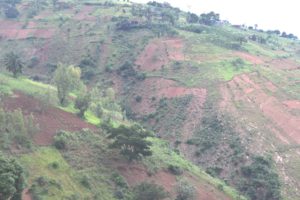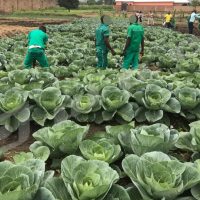
Farmers in hilly areas say irrigation is impossible
The practice of irrigation to make up for insufficient rain fall as recently advised by the Minister of Agriculture and Farming is a great idea which nonetheless seems impracticable for farmers on steep land, according to farmers in the hills of Bujumbura province.
Burundi is seriously struck by the negative effects of climate change. The 2016 Integrated Food Security Phase Classification (IPC) report said that, “family farming, the main source of food and means of existence of about 90% of the Burundi population, is now jeopardized by recurring natural disasters.”
The last growing season starting in September 2016 was marked by periods of severe drought. Different provinces of the country like Bubanza, Kirundo and Muyinga were struck with food shortage. At the beginning of January 2017, the first starvation-caused death cases were reported in Bubanza province, where residents still claim hunger is still contributing to the death of many people.
The Minister of Agriculture and Farming, Déo Guide Rurema, says “farmers should fetch water to irrigate their farms”
Dieudonné Ndayishimiye, a farmer in Kabezi, says, “Irrigation is almost impossible for us living in steep areas”. He is in his forties and he is a father of five. Like the majority of the inhabitants of the rural district of Kabezi, Bujumbura province, he lives on farming.
He and other farmers say that irrigation in hilly areas of the district means carrying water on the head, sometimes from streams at the bottom of valleys, up to the top where beans, maize, and other crops are grown.
“It’s impossible to rely on water carried on the head to irrigate our farms in the mountains”, says Raissa Mugisa, 21, a mother of one.
Besides, she says the many small streams running down between the hills of Kabezi district often go dry when there is no rain. “We couldn’t find water in time of drought even if we were able to carry it in sufficient quantity to water our farms”.
Dieudonné Bizimana, the Principal Advisor to the Governor of Bujumbura province shares the view that irrigation is not possible on most steep mountains around Bujumbura.
He says residents need education on alternative methods of coping with drought. Building artificial reservoirs to retain water in periods of rainfall would be a good way to make sure water is available in time of drought.
Salvator Ndabirorere, an FAO expert in natural resources management, says inhabitants of hilly areas where irrigation is not feasible should grow drought tolerant crops such as cassava and sweet potatoes.
The expert also says farmers should adopt highly productive kitchen gardening practices to grow vegetables. “They should also favour short season crops”.
The expert says these different farming practices complement each other and would help the population to cope with climatic variations.















 IWACU Open Data
IWACU Open Data

